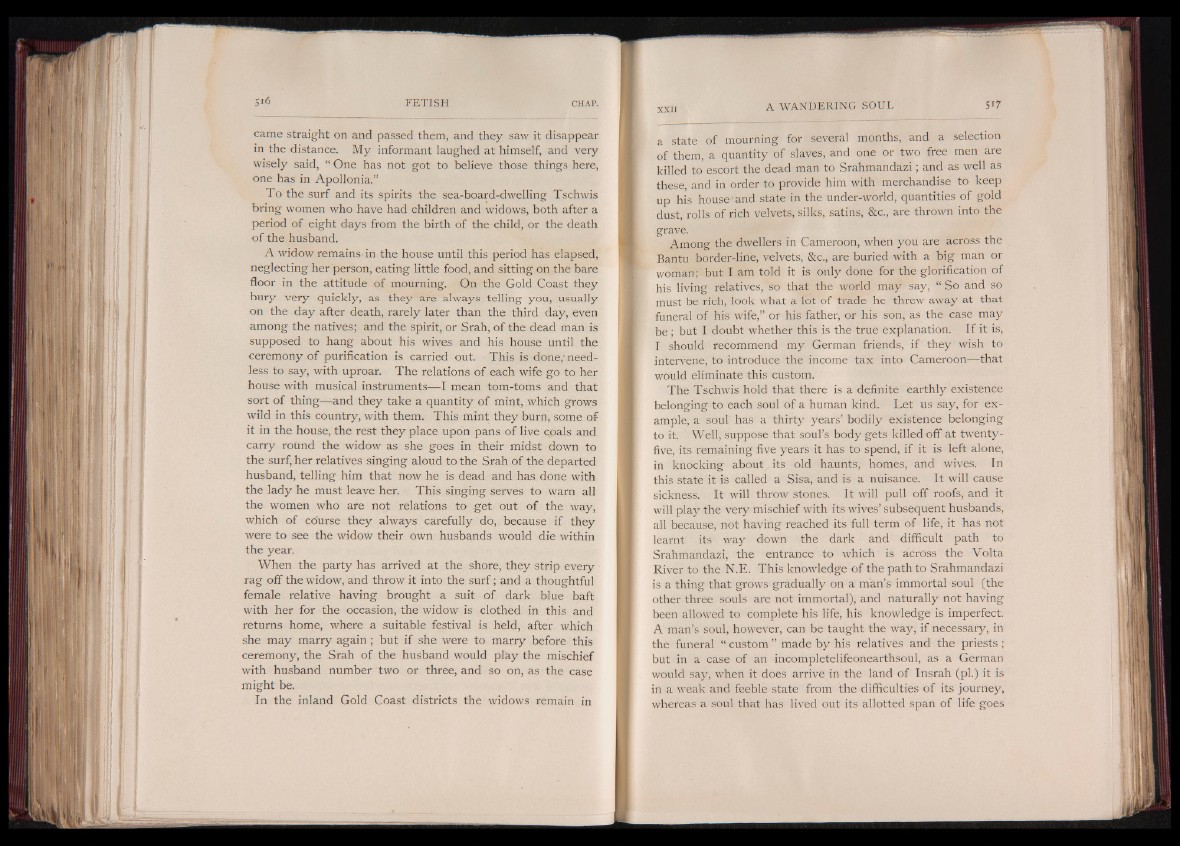
came straight on and passed them, and they saw it disappear
in the distance. My informant laughed at himself, and very
wisely said, “ One has not got to believe those things here,
one has in Apollonia.”
To the surf and its spirits the sea-board-dwelling Tschwis
bring women who have had children and widows, both after a
period of eight days from the birth of the child, or the death
o f the husband.
A widow remains-in the house until this period has elapsed,
neglecting her person, eating little food, and sitting on the bare
floor in the attitude of mourning. On the Gold Coast they
bury very quickly, as they are always telling you, usually
on the day after death, rarely later than the third day, even
among the natives; and the spirit, or Srah, of the dead man is
supposed to hang about his wives and his house until the
ceremony of purification is carried out. This is done,* needless
to say, with uproar. The relations of each wife go to her
house with musical instruments— I mean tom-toms and that
sort of thing— and they take a quantity of mint, which grows
wild in this country, with them. This mint they burn, some of
it in the house, the rest they place upon pans of live coals and
carry round the widow as she goes in their midst down to
the surf, her relatives singing aloud to the Srah of the departed
husband, telling him that now he is dead and has done with
the lady he must leave her. This singing serves to warn all
the women who are not relations to get out of the way,
which of course they always carefully do, because if they
were to see the widow their own husbands would die within
the year.
When the party has arrived at the shore, they strip every
rag off the widow, and throw it into the surf; and a thoughtful
female relative having brought a suit of dark blue baft
with her for the occasion, the widow is clothed in this and
returns home, where a suitable festival is held, after which
she may marry again ; but if she were to marry before this
ceremony, the Srah of the husband would play the mischief
with husband number two or three, and so on, as the case
might be.
In the inland Gold Coast districts the widows remain in
a state of mourning for several months, and a selection
of them, a quantity of slaves, and one or two free men are
killed to escort the dead man to Srahmandazi; and as well as
these, and in order to provide him with merchandise to keep
up his house-'and state in the under-world, quantities of gold
dust, rolls of rich velvets, silks, satins, &c., are thrown into the
grave.
Among the dwellers in Cameroon, when you are across the
Bantu border-line, velvets, &c., are buried with a big man or
woman; but I am told it is only done for the glorification of
his living relatives, so that the world may say, “ So and so
must be rich, look what a lot of trade he threw away at that
funeral of his wife,” or his father, or his son, as the case may
b e ; but I doubt whether this is the true explanation. If it is,
I should recommend my German friends, if they wish to
intervene, to introduce the income tax into Cameroon— that
would eliminate this custom.
The Tschwis hold that there is a definite earthly existence
belonging to each soul of a human kind. Let us say, for example,
a soul has a thirty years’ bodily existence belonging
to it. Well, suppose that soul’s body gets killed off at twenty-
five, its remaining five years it has to spend, if it is left alone,
in knocking about its old haunts, homes, and wives. In
this state it is called a Sisa, and is a nuisance. It will cause
sickness. It will throw stones. It will pull off roofs, and it
will play the very mischief with its wives’ subsequent husbands,
all because, not having reached its full term of life, it has not
learnt its way down the dark and difficult path to
Srahmandazi, the entrance to which is across the Volta
River to the N.E. This knowledge of the path to Srahmandazi
is a thing that grows gradually on a man’s immortal soul (the
other three souls are not immortal), and naturally not having
been allowed to complete his life, his knowledge is imperfect.
A man’s soul, however, can be taught the way, if necessary, in
the funeral “ custom ” made by his relatives and the priests ;
but in a case of an incompletelifeonearthsoul, as a German
would say, when it does arrive in the land of Insrah (pi.) it is
in a weak and feeble state from the difficulties of its journey,
whereas a soul that has lived out its allotted span of life goes